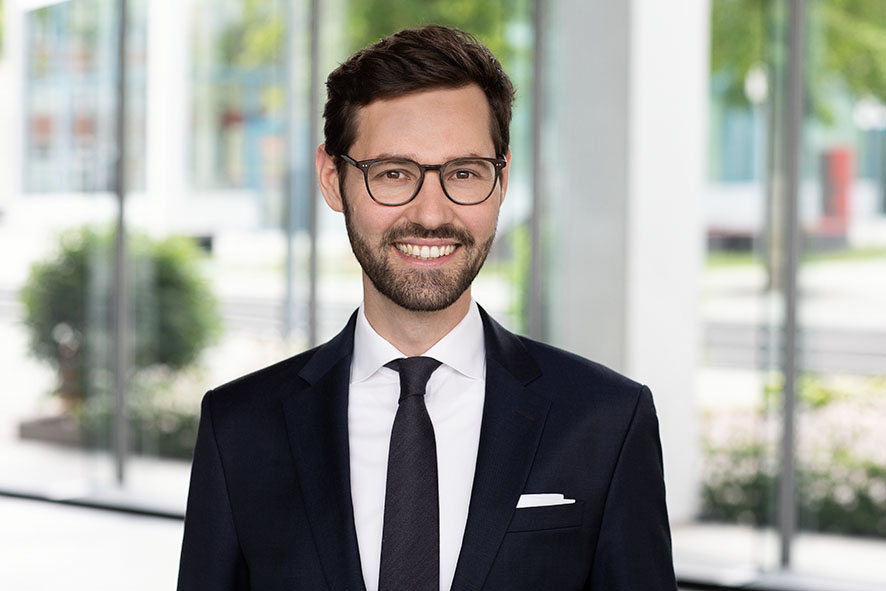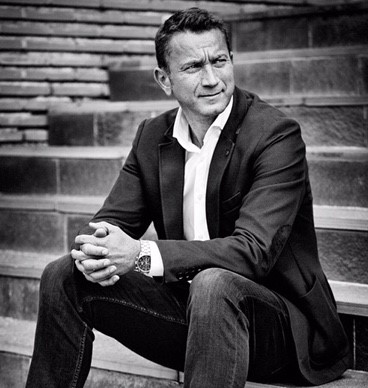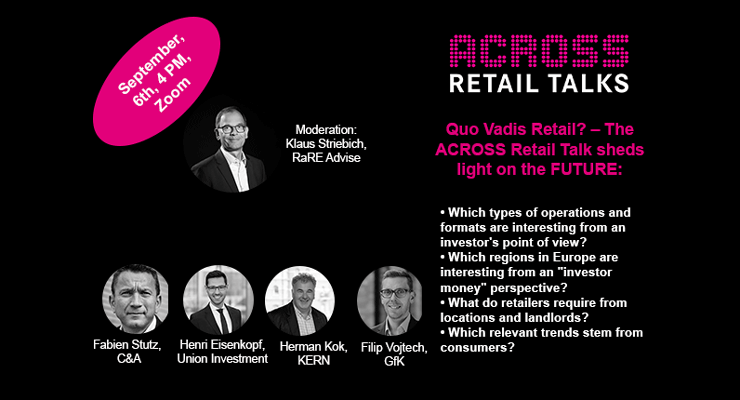Together with our partner Union Investment and four top-class panelists ACROSS took an ambitious look into the future of retail. The conclusion: There is a bright future for retail, but we all have to work hard for it.
A big and prominent audience of experts followed the discussion between:
- moderator Klaus Striebich, RaRE Advise and Head of the ACROSS Advisory Board
- for the investment perspective: Henri Eisenkopf, Senior Investment Manager at Union Investment based in Hamburg, Germany and responsible for retail investment across Europe
- for the retail perspective: Fabien Stutz is Head of Real Estate for C&A. He has been leading that all over Europe for various brands – one of them was Nike.
- for the valuable industry overview: Herman Kok, who is as the Director of Kern and a member of the ACROSS Advisory Board.
- as a retail data expert: Filip Vojtech is Teamlead Sales Retail, Fashion & Lifestyle for GfK GeoMarketing.
Talking about retail, Klaus Striebich stated right at the beginning, means talking about a lot of buzzwords like sustainability, community innovation, omnichannel platform business, supply chain, local supply, mixed use projects, placemaking, and of course consumer confidence. The question is: Will this be the drivers for a prosperous retail future and how should we work on that?
GRAI index – The basis for the discussion
Union Investment’s Global Retail Attractiveness Index (GRAI) measures the attractiveness of retail markets across a total of 20 countries in Europe, North America and the Asia-Pacific region. Compiled every six months by market research company GfK, the Index consists of four key KPIs: consumer confidence, retail confidence, unemployment rate und development of the retail turnover. Current data for the second quarter of 2022 shows an index of minus seven in comparison to Q2 in 2021. Most pressure comes from the consumer confidence (minus 29 points) and not yet from the retail perspective. The European country that is struggling most is Denmark. The war in Ukraine affects the sentiment among consumers and retailers resulting in a slump from March onwards. It can be assumed that a much more heterogeneous picture will emerge in the European retail landscape and in the Retail Index in the second quarter, when inflation, supply bottlenecks, and further consequences of the war in Ukraine have a stronger impact on sentiment among retailers and consumers.
Click HERE to watch the entire talk:
The discussion on retail attractiveness – some highlights
What does the uncertainty in our current situation mean: Is it a time for opportunity or simply a struggle for survival?
In a clear statement Fabien Stutz said it is more about opportunities. “Most brands are in a state of optimization,” he said. Brands have the chance to really think what the role of their stores are in a new environment, where sizes are perceived differently, and digital integration is key. They are turning stores into marketplaces. This also leads to changes on the retail real estate side, there is a lot of turnover. The market becomes way more agile. But for sure there is a growing conflict of interest. Retailers favor shorter leases while investors need to have longer lease terms.
Is retail at the moment more a risk or an opportunity for investors?
Henri Eisenkopf stated that there is a negative mood when it comes to consumers consumption. Consumer sentiment is at the lowest since many years, it will have an impact on disposable income in the upcoming month and this will hit the market. “On the other hand, we do not see that turnovers are decreasing as of today,” he said. “We see that retailers are looking back to local shopping”. They are closing less profitable shops but also expanding the successful ones. For the long-term perspective Eisenkopf clearly said, that retailers, landlords, center managers but also consumers and politicians must team up to face challenges like sustainability, taxonomy or reduction of energy and find pragmatic solutions. From his company’s portfolio the long-term opportunity is placemaking, which means the individual use of each asset. The product is in the center. “There are shopping centers that are making great turnover, even though they are located in countries where the inflation is very high,” he explains.
Is there any predictability at all?
Filip Vojtech explained the speed of how consumers preferences are changing. During the pandemic electronic retailers for example had very high turnovers, while fashion was down. Now that the people are moving back to offices and leaving home office behind fashion turnovers are high while electronic retailers suffer. “Taking into account the fast changes, it is very difficult to give a prognosis for the next months,” he said.
Herman Kok agrees: “A lot of spendings were made during the pandemic especially when it came to higher prized goods like electronics. These spendings will not be made again in the near future.” The current inflation amplifies this trend. There is a shift from full-service supermarkets to discount supermarkets and a shift from branded products to store brands. But: “The extent in which governments are willing and able to support spending power in the coming months is going to be a key question,” Kok states.
Is the placemaking industry fast enough to adapt to current needs?
Yes: Investors like Union Investment are investing heavily in their assets. “We need to make a difference in quality of stay, in appearance, and the asset itself for the consumers,” Eisenkopf said. “Tenants not only appreciate this; they are also investing in their shops.” This way they also sign longer leases and want to secure their location for the future.
Top three recommendations to cope and manage a bright retail future:

1. Working together 2. Flexibility 3. Trust in the success of retailers

1. Service 2. Agility 3. Be a partner between your brand and the environment

1. Placemaking with a focus on the local community 2. Increased need for flexibility 3. Cooperation of all stakeholders

Offering 1. great service 2. great products and 3. great products to the consumers







